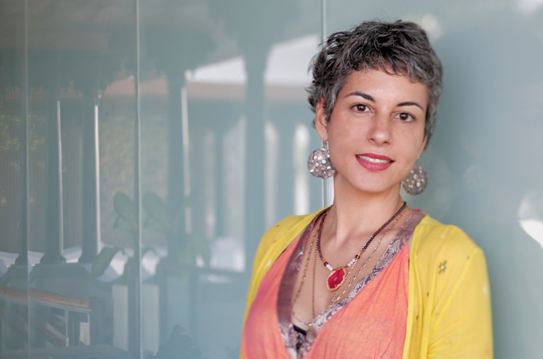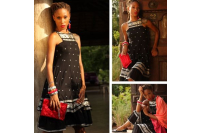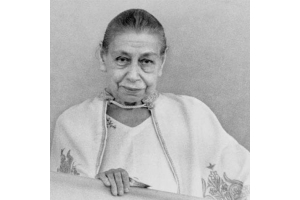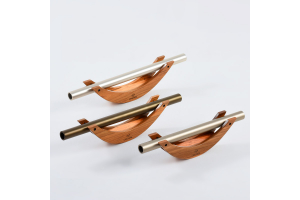Meet Auroville: Prema from Rangoli

Prema Florence Isaac fell in love with fabric at a very young age. She designed her first dress at the age of four! Playing with cloth and designing clothes her entire childhood, she was destined to go into the fashion design industry. “In 1999, with the encouragement of family, friends and well-wishers, I took the plunge, hired artisans, and started Rangoli. Over the years, we grew organically as our business increased.”
One day, she was gifted two saris that would become the standard to which she compared all fabric. These were from the traditional Tangail and Jamdani weaving traditions. She transformed them into dance costumes which she used for her Odissi dance practice. “Clothing is like a second skin to me, so the design and fabrics are very important” she points out, the pure artistry and craftsmanship that goes into making these exquisite weavings has led Jamdani, for example, declared a UNESCO Intangible Cultural Heritage of Humanity.
The weaving of Jamdani comes from Bengal. It is a hand loom woven fabric made of cotton, which was historically referred to as muslin. It is one of the most time and labor-intensive forms of hand loom weaving with in loom embroidery. During the Mughal period, the figured or flowered muslin came to be known as the Jamdani and was always considered the most expensive productions of the Dhaka looms. In the 19th Century, a gradual decline in the quality and production of this highly skilled craft made such fabrics harder to find.
Simultaneously, handloom cottage industries in the Tangail district of Bangladesh evolved at the end of nineteenth century. The weavers of this Tangail fabric are the successors of the famous Jamdani weavers. While weaving has become simpler after the implementation of the jacquard looms and technique introduced in the 1930’s, it is still a very complex process. There is a secret craft, handed down from generation to generation which is not mentioned much and that is the use of mantras as reference points during the weaving process. “The luxurious feel of the fabric, the sacred geometry in the patterns, the consciousness and love in the weaving, even the singing of mantras during the work – all of these result in a fabric that is beautiful at a spiritual level in addition to its wonderful physical attributes.”
“With cheap imported fabrics taking over the market, the distribution channel was forced to compete by lowering the quality of the saris that they sourced. So, in 2005, I went to West Bengal villages to find these weavers. What brought me to tears was a framed picture of Mother and Sri Aurobindo along with the Auroville Charter displayed on the wall of one of the Cooperative Societies.” The latter were created to help revive the Bengali traditions, search for the deeper meaning behind these and showcasing them to the world.
With only trained skilled weavers inheriting this tradition, Prema decided then that she would commit to help preserve the craft by only working with them as a source for her fabrics. She integrates the craft by designing her own fabric, in loom embroideries and jacquard borders, sometimes adding Japanese origami folds as well or reversing the fabric to create more texture.
It is now 2019 and Rangoli is celebrating its 20th year Anniversary. Prema’s vision is that this unique craft stays alive, “the work of designers like me needs to be successful for this ecosystem to survive and thrive” she points out. There are enough weavers to sustain a growth in Tangail and Jamdani fabric production. Her main hurdle, she admits, is that “sales and marketing are not my strong points”. She is searching for more retail outlets that do not require garments to be sold on consignment only. “In India, almost all the boutiques work on a consignment basis only. It can work well at times but when it doesn’t, it places unsustainable financial burdens on the label. A few years ago, I stopped consignment entirely and I have been looking for other ways to sell.” In recent years she has sold at boutiques in Ibiza, has participated in “pop up” events in Paris, Argentina, Japan, Singapore, the USA and Canada. She also has individual clients, both domestic and international, who buy during visits to the atelier and later email and Direct Message. This is a good start and she feels that with better visibility, this clientele can grow to create a thriving business.
Prema Florence Isaac hopes that by informing the public about the origins of the fabric, a greater support for Rangoli and the weavers they support will follow. Domestically, one can always make an appointment for ‘made-to-order’ measurements at the Atelier, ordering online at www.premaflorenceisaac.com or by visiting La Boutique d’Auroville at the Auroville Visitors Center.
Picture rights with Dinh Thi Tien.








